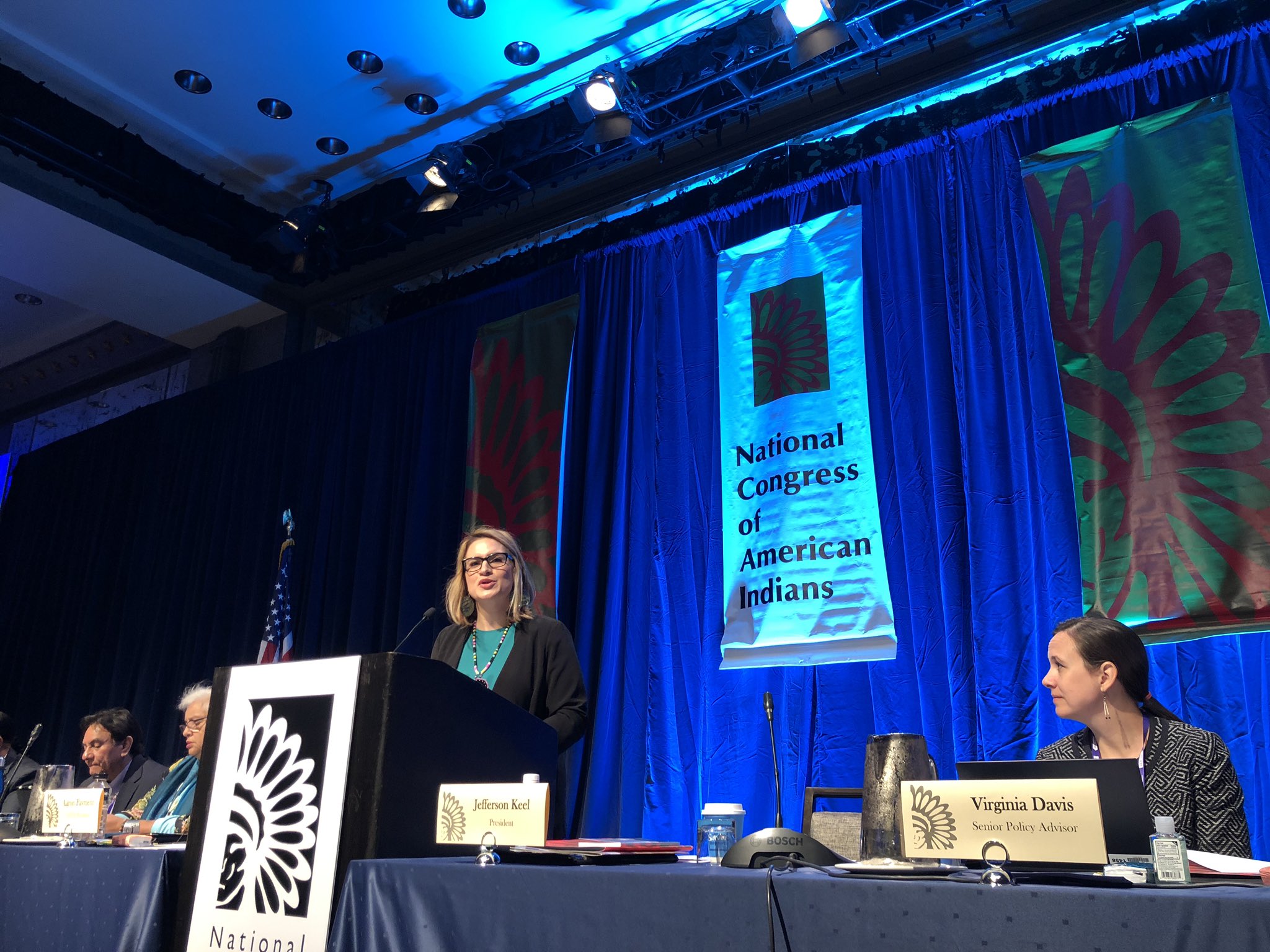
Lt. Gov. Peggy Flanagan (D-Minnesota). Photo by Indianz.Com (CC BY-NC-SA 4.0)
For Immediate Release:
April 16, 2020
Contact:
Molly Morrissey (Smith), 202-224-9857
Teddy Tschann (Flanagan), 651-402-8841
U.S. Senator Tina Smith, Minnesota Lieutenant Governor Peggy Flanagan: Coronavirus
Relief Funding Meant for Tribes Should Go To Tribal Governments, Not Corporations
Senator, MN Lieutenant Governor Say Trump Administration Must Uphold
Responsibility to Provide Relief Granted Through Coronavirus Relief Package to Tribes
WASHINGTON, D.C. [04/16/20]—Today, U.S. Senator Tina Smith (D-Minn.) and Minnesota Lieutenant Governor Peggy Flanagan voiced concerns over the Trump Administration’s apparent move to send a portion of CARES Act relief intended for Tribal governments to for-profit Alaska Native corporations.
The CARES Act provides $8 billion in critical relief to Tribal governments so they can respond to the COVID-19 pandemic and continue to provide essential government services. The U.S. Treasury Department is required to distribute the $8 billion by April 24, but the Trump Administration is already signaling that it is putting for-profit corporations ahead of Tribal governments and Tribal members. Sen. Smith and Lt. Gov. Flanagan say this is wrong, and that this flies in the face of Congressional intent to help Tribes.
“This shouldn’t need clarification, yet it bears repeating for the Trump Administration: Congress fought for $8 billion for Tribal governments, and we intended that these resources would go only to Tribal governments. I have heard directly from Tribal leaders in Minnesota about the devastating economic impact of coronavirus on Native people. Tribal governments made the difficult decision to close Tribal enterprises like casinos, but this has been doubly damaging to Tribes because of both loss of jobs and also a loss of income for basic government services. Tribes need relief so they can protect public health and continue to fund essential nutrition programs, public safety operations, and other government services,” said Sen. Smith, a member of the Senate Indian Affairs Committee. “Tribal Nations in Minnesota have government to government relationships with the federal government and deserve parity with the state and local governments that are also getting relief. The Treasury Department must distribute these funds based on what Congress intended to provide economic stabilization for Tribal governments. Tribes across the country deserve to get their fair share. I will continue to press Treasury Secretary Mnuchin to put Tribes and people over corporations.”
“As a Native woman and as Lieutenant Governor of Minnesota, I see how the COVID-19 pandemic is exacerbating existing health and economic disparities in communities of color and our Tribal Nations in Minnesota and across the nation. We are responding urgently at the state level to provide economic relief to our Tribes, and we are leaning on the long-standing relationships we have built with our Tribal leaders to communicate and respond to the challenges they are facing during this public health crisis. It is our expectation that the federal government also fulfill their obligations, and that every Tribe gets a fair and equitable share of the funding Congress has promised. I am grateful for the advocacy and partnership of Senator Tina Smith and Representative Betty McCollum to make sure the voices of our Tribal nations are heard in the halls of Congress,” said Minnesota Lieutenant Governor Peggy Flanagan. “Just as the State of Minnesota has a government-to-government relationship with our eleven Tribal nations, the federal government has a nation-to-nation relationship with federally recognized Tribes to honor. Our job as public servants is to be good partners and to do all that we can to make sure they have the resources they need—including the $8 billion dollars allocated by the U.S. Congress in the CARES Act.”
Tuba City Regional Health Care Corporation (Navajo Nation)
HHS Small Ambulatory Program Awards $55 Million to 15 Tribes and Tribal Organizations (Indian Health Service)
Indian Health Service Announces New Deputy Director for Quality Health Care and Enterprise Risk Management (Indian Health Service)
Federal Emergency Management Agency (FEMA)
White House Office of Management and Budget (Joe Biden Administration)
Tuba City Regional Health Care Corporation (Arizona, Navajo Nation)
Oklahoma City Indian Clinic (OKCIC)
Indian Health Service (Department of Health and Human Services)
Navajo Nation Town Hall (Arizona, New Mexico, Utah)
Navajo Nation (Arizona, New Mexico, Utah)
Tribal organizations statement on advance appropriations for Indian Health Service
Indian Health Service Statement on Advance Appropriations (Department of Health and Human Services)
Indian Health Service (Department of Health and Human Services)
Indian Health Service (Department of Health and Human Services)
